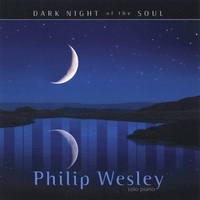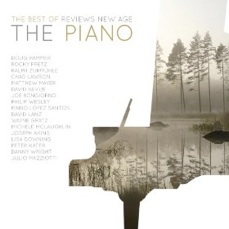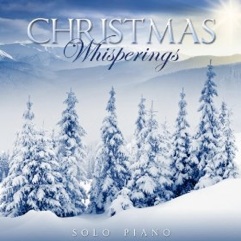
Dark Night of the Soul
Philip Wesley
2008 / Autumn Music
70 minutes
Review by Michael Debbage
Back in 2002 Philip Wesley released his very impressive debut Finding Solace and has since recorded two other fine albums to add to an already impressive discography. His fourth release Dark Night Of The Soul only adds credence to his recording portfolio. Replacing his lighthearted melodies with more complex arrangements, they require a little more patience and endurance before the melodies find a place in your heart.
Keeping the theme in mind, “Lamentations Of The Heart” originally heard on Wesley’s debut album finds a repeat visit on Dark Night of the Soul. Otherwise the album has a total of eleven new recorded songs composed, arranged and performed by Wesley. However, Wesley uses the engineering services of Michael Dulin, well known for his own excellent sound recordings and it pays significant dividends smoothing out the sound of Wesley’s performances.
Otherwise, the album is pure piano performances of Wesley who delivers immediately with the demanding “Tears Of The East”. Combining Middle Eastern themes interlinked with a sweet chorus the composition has several movements creating a very progressive feel to the composition. The challenging themes continue with the very fast pace of “Racing Against The Sunset” that demands perfect execution. Needless to say Wesley is in top of his game and delivers like we have never heard before.
Wisely, Wesley slows down the pace with the somber reflections of “The Approaching Night” that clocks in close to seven minutes. In fact, eight of the twelve tracks are given over five minutes to flower and breathe, the longest being “Far And Away” which is designated over nine minutes of playing time. Much like the title track it takes a while to get to the chorus but the build up is worth its weight in gold. In the past, comparisons with David Lanz have been unavoidable, but it here that we see Wesley borrowing more from the great improviser Michael Jones. However, he teases us with just enough structure to keep the performance warm. Speaking of warmth, Wesley winds down the album with the instant gratification of the shorter and hopeful “New Day” then brings the album to conclusion with the sparse yet poignant “Two Souls”.
Wesley quotes from the Scriptures on more than one occasion in his liner notes. Following this trend, Isaiah 40:26 states to “Lift your eyes and look to the heavens: Who created all these”? The darkest of nights always increases the odds of us seeing and being reminded of God’s handiwork. Much like the more somber tone of Dark Night of the Soul, Wesley’s lamentations are filled with hidden hope reminding us that the Creator is always in control, even in the darkest of times.
August 1, 2008

2012
(contributing artist)

2012
(contributing artist)

